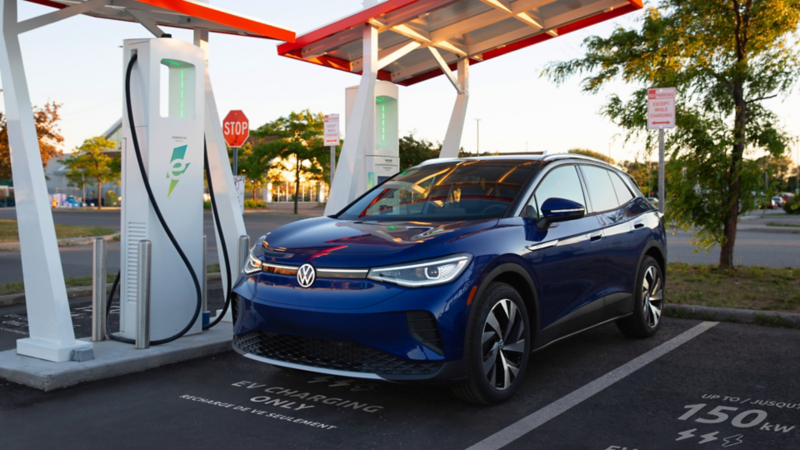Home Charging for Electric Vehicles: In Short
Charging an electric vehicle at home is often the most economical, practical and stable option for Quebec drivers . On average, it costs between $2.50 and $5.00 per 100 km, depending on the type of vehicle and your electricity rate. In comparison, filling up with gasoline for the same distance can easily cost $15 or more; up to 5 times as expensive!
Summary table of estimated costs by type of charging station
| Type of Charging Station |
Cost per 100 km |
Approximate Charging Time |
|
120 V outlet (level 1)
|
$4.50 to $6.00
|
12 to 20 hours
|
|
240 V charging station (level 2)
|
$2.50 to $3.50
|
4 to 8 hours
|
|
Fast public charger
|
$5.00 to $12.00
|
30 to 60 minutes
|
| Type of Charging Station |
Cost per 100 km |
Approximate Charging Time |
|
120 V outlet (level 1)
|
$4.50 to $6.00
|
12 to 20 hours
|
|
240 V charging station (level 2)
|
$2.50 to $3.50
|
4 to 8 hours
|
|
Fast public charger
|
$5.00 to $12.00
|
30 to 60 minutes
|
*Source: Hydro-Québec, BEQ Technology
Factors Influencing Charging Costs
Several factors influence the actual cost of charging your electric vehicle at home.
Cost of electricity and consumption (kwh)
- In Quebec, Hydro-Québec's residential rate is one of the lowest in North America: approximately $0.10/kWh.
- An electric vehicle typically consumes 15 to 20 kWh per 100 km.
- At this rate, it comes to $1.50 to $2.00 per 100 km of driving.
The impact of the type of charging station and power
- A standard 120 V outlet is slow and less efficient over time.
- A level 2 charging station (240 V) optimizes charging times while remaining economical.
- The more powerful the charger, the faster the charging, but the initial installation cost may also increase.
Volkswagen ID.4 and home charging
|
Charger type
|
Estimated cost/ 100 km
|
Charging time
|
Remarks
|
|
120 V (level 1)
|
$4.80
|
~20 h
|
Slow charging, but feasible for short trips
|
|
240 V (level 2)
|
$2.70
|
~7 h
|
Optimal solution for daily use
|
|
Fast public charger (DCFC)
|
$10.00
|
~40 min
|
Practical, but more expensive
|
|
Charger type
|
Estimated cost/ 100 km
|
Charging time
|
Remarks
|
|
120 V (level 1)
|
$4.80
|
~20 h
|
Slow charging, but feasible for short trips
|
|
240 V (level 2)
|
$2.70
|
~7 h
|
Optimal solution for daily use
|
|
Fast public charger (DCFC)
|
$10.00
|
~40 min
|
Practical, but more expensive
|
*Calculations based on a consumption of 18 kWh/100 km
Charging at home or at a public station?
Home charging
Advantages:
✅ Economical in the long term
✅ Overnight charging
✅ Stable pricing
Disadvantage:
❌ Initial cost for the charging station (~$1,000 to $2,000)
Public charging
Advantage:
✅ Quick access while on the go
Disadvantages:
❌ More expensive (~$0.25 to $0.50/kWh)
❌ Less predictable, sometimes crowded
How to Get a Level 2 Charging Station?
Acquiring a level 2 charging station is now straightforward and accessible, whether for a single-family home or a multi-residential building.
Pro-Tips:
- Choose a charging station that is CSA or UL certified and that is compatible with North American standards (J1772).
- Prioritize models designed for Quebec winters, able to operate at -30 °C or lower.
- Keep the detailed invoice of the purchased product and ensure that the charging station is on the list of eligible models.
- Before purchasing, it is recommended to have your electrical panel evaluated by a professional to ensure compatibility.
Guide to installing a charging station
Key steps:
- Choose the Right Residential Charging Station
- Level 2 recommended (240 V, 30 to 50 amps)
- Purchase cost: between $700 and $1,500
- Hire a Certified Master Electrician
- Professional installation is essential for safety.
- Average installation cost: between $500 and $1,200, depending on your electrical panel configuration.
- Check Eligibility for Rebates
- The Roulez Vert program reimburses up to $600 for the purchase and installation of a residential charging station.
Estimated total cost for complete installation:
|
Item
|
Approximate price
|
|
Residential charging station
|
$1,000
|
|
Electrical installation
|
$800
|
|
Government rebate
|
-$600
|
|
Net Total Cost
|
≈ $1,200
|
|
Item
|
Approximate price
|
|
Residential charging station
|
$1,000
|
|
Electrical installation
|
$800
|
|
Government rebate
|
-$600
|
|
Net Total Cost
|
≈ $1,200
|
Electricity vs. Gasoline: What Long-Term Savings?
One of the main advantages of home charging is the substantial savings compared to the cost of a traditional fuel vehicle.
Concrete comparison over 20,000 km per year:
|
Type of powertrain
|
Average consumption
|
Estimated annual cost
|
|
Gasoline (8 L/100 km at $1.75/L)
|
1,600 L
|
≈ $2,800
|
|
Electric (18 kWh/100 km at $0.10/kWh)
|
3,600 kWh
|
≈ $360
|
|
Type of powertrain
|
Average consumption
|
Estimated annual cost
|
|
Gasoline (8 L/100 km at $1.75/L)
|
1,600 L
|
≈ $2,800
|
|
Electric (18 kWh/100 km at $0.10/kWh)
|
3,600 kWh
|
≈ $360
|
Annual savings: approximately $2,400
Over a 5-year period, an average driver can save up to $12,000 on fuel costs alone; this does not even take into account the typically lower maintenance expenses for electric vehicles (no oil changes, less brake wear, etc.).
In Summary:
- Electricity costs about 6 to 8 times less per kilometer than gasoline .
- Costs are more predictable and less susceptible to global fluctuations.
- Combined with subsidies , the overall savings make electric mobility highly cost-effective.
Savings on maintenance with an electric vehicle
In addition to low charging costs, electric vehicles provide significant savings on routine maintenance. Why? Because an electric motor has fewer moving parts than a combustion engine, considerably reducing maintenance needs.
Maintenance: gasoline vs. electric
|
Maintenance item
|
Gasoline vehicle
|
Electric vehicle
|
|
Oil changes
|
3 to 4 times/year
|
None
|
|
Fuel filter
|
Yes
|
None
|
|
Exhaust system
|
Yes
|
None
|
|
Transmission
|
Complex (often requires servicing)
|
Simpler or non-existent
|
|
Brakes
|
Frequent replacement
|
Less wear due to regenerative braking
|
|
Maintenance item
|
Gasoline vehicle
|
Electric vehicle
|
|
Oil changes
|
3 to 4 times/year
|
None
|
|
Fuel filter
|
Yes
|
None
|
|
Exhaust system
|
Yes
|
None
|
|
Transmission
|
Complex (often requires servicing)
|
Simpler or non-existent
|
|
Brakes
|
Frequent replacement
|
Less wear due to regenerative braking
|
Estimated average annual costs
- Gasoline vehicle: $800 to $1,200
- Electric vehicle: $300 to $500
Over a 5-year period, an electric vehicle owner could save between $2,500 and $4,500 solely on maintenance costs.
Other advantages:
- Fewer unexpected trips to the repair shop
- Increased mechanical reliability
- Fewer wear-prone components (belts, spark plugs, injectors)
These savings add to the fuel savings, reinforcing the overall cost effectiveness of an electric vehicle over the long term.
Charging your electric vehicle at home represents a smart investment for Quebec drivers. With a per-kilometer cost that is 3 to 5 times lower than gasoline, unparalleled price stability, and attractive rebates, home charging is a sustainable, practical, and economical solution.
Before having your charging station installed, make sure that you:
- Choose a model that meets your needs
- Compare installation prices
- Take advantage of available financial incentives
And most importantly, do the math: depending on your driving habits, you could save between $1,200 and $2,000 per year on fuel!









